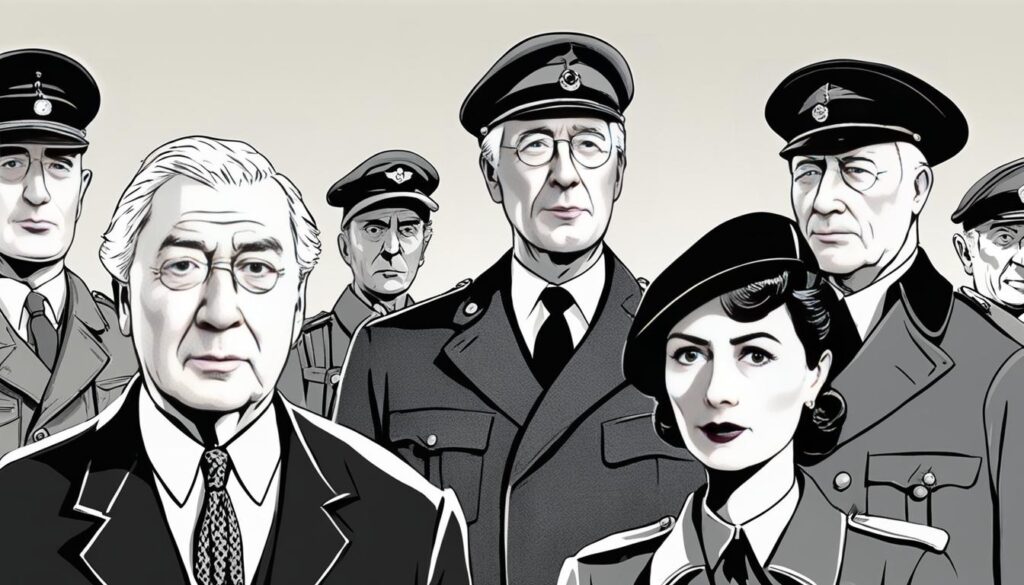If you’re a fan of thrilling espionage novels set against the backdrop of World War II resistance, then Ken Follett’s “Jackdaws” is the book for you. This book summary will introduce you to the gripping narrative of “Jackdaws,” which tells the story of a group of female spies who undertake a dangerous mission to disrupt Nazi activities in France.
In this article, we’ll explore the overall plot, setting, and characters of “Jackdaws,” highlighting the espionage and resistance aspects of the story. We’ll also analyze the themes, writing style, and critical reception of the book, before discussing its impact and legacy on popular culture. By the end of this article, you’ll have a deeper understanding of the intrigue and historical significance of “Jackdaws.”
Overview of “Jackdaws”
Set against the backdrop of World War II, “Jackdaws” is a thrilling tale of espionage and resistance crafted by acclaimed author Ken Follett. The story follows a team of female operatives who embark on a dangerous mission to sabotage a key telephone exchange in Nazi-occupied France.
The book boasts a gripping plotline filled with twists and turns as the characters navigate their way through enemy territory and battle their own personal demons. As with many of Follett’s works, the book highlights the human cost of war and individual heroism that arises in times of crisis.
The themes of espionage and resistance serve as the driving force behind the narrative, with tensions ramping up as the stakes become higher. Follett’s meticulous attention to detail and vivid descriptions of the wartime setting help to transport readers into the heart of the action, making “Jackdaws” a thoroughly immersive experience.
At its core, “Jackdaws” demonstrates the tenacity and bravery that defined the WWII resistance efforts, making it a must-read for fans of historical fiction and espionage thrillers.
Setting of “Jackdaws”
Ken Follett’s “Jackdaws” is set in Nazi-occupied France during World War II, where the French Resistance undertakes daring espionage missions. The book vividly describes the challenges of life under Nazi occupation, with the Resistance struggling to undermine the enemy’s hold on the country. The portrayal of the French people’s suffering and resistance underscores the enormity and significance of the events in the story.
France during World War II
France was a crucial battleground in World War II, with its strategic location making it a target for German invasion. In 1940, Nazi Germany invaded and occupied France, imposing their authority and systematically suppressing French resistance efforts. The occupation lasted until 1944 and was marked by numerous atrocities, including the deportation and execution of thousands of French Jews. Although the invasion was eventually thwarted, the scars of war and occupation remained for years to come.
Characters in “Jackdaws”
Ken Follett’s “Jackdaws” features a diverse cast of characters who come together to form a team of WWII resistance fighters. Felicity Clairet, a French woman working as a saboteur, is the protagonist of the story, and she leads the group made up of other prominent characters like Jacqueline, who specializes in explosives, and Bernie, a radio operator.
Another key member of the team is Dieter Franck, a German soldier who disobeys orders to sabotage his own country. Other characters include Harry, an American pilot who is shot down over France, and Gaston, a farmer who helps the resistance with information and resources.
Each character brings their unique set of skills and perspectives to the resistance effort, highlighting the importance of collaboration and diversity in achieving goals amidst the chaos of war.

The characters in “Jackdaws” are vividly depicted, with scenes revealing their individual strengths and struggles. Ken Follett’s portrayal of these characters adds depth to the novel and emphasizes the human experiences during the fraught time of WWII resistance.
Plot Summary of “Jackdaws”
In “Jackdaws” by Ken Follett, set during World War II, a group of allied women embark on a dangerous espionage mission in Nazi-occupied France to blow up a crucial telephone exchange that could potentially derail the D-Day invasion.
Leading the mission is Felicity “Flick” Clairet, a skilled radio operator and the only one with any experience in espionage work. Also, the group includes two Frenchwomen: Jacqueline, who has a daughter in a concentration camp and Gaëlle, who is fiercely committed to the resistance cause.
As the women encounter numerous obstacles, including betrayal by someone close to the group, they must summon up courage, creativity, and resilience to survive the dangers of their mission. The story is an intense portrayal of wartime intrigue and espionage, executed against a backdrop of Nazi barbarity, as well as human courage, loyalty, and sacrifice in the face of monstrous evil.
Their mission proves to be a success as the telephone exchange is destroyed, greatly impeding the Nazi’s war efforts. However, not all of the women make it out unscathed as some are captured, killed, or severely injured. Nonetheless, their bravery and determination allow them to succeed in their objective and contribute significantly to the Allied victory.
Themes Explored in “Jackdaws”
Ken Follett’s “Jackdaws” not only presents readers with an intriguing espionage story but also explores several themes that are central to the backdrop of WWII resistance. One of the dominant themes in the book is heroism, which is embodied by the main characters. They put aside their fears to engage in dangerous espionage missions that could change the outcome of the war. The book also explores the themes of sacrifice and loyalty, as the characters risk their own lives to protect others and fight for their country’s freedom.
Furthermore, “Jackdaws” portrays the resilience of individuals in times of war and resistance, highlighting their ability to persevere amidst extreme adversity. The victories and losses of the characters in their espionage efforts are described with authenticity and emotion, demonstrating how war can also extend to the human psyche.
Another important theme that Follett explores in the book is the morally ambiguous nature of espionage and resistance. The characters are forced to engage in questionable acts to achieve their goals, leading to a sense of moral conflict within them. This raises profound questions about the ethics of war and resistance.
The combination of these themes adds depth and nuance to the narrative of “Jackdaws,” making it an emotionally engaging read that delves into the complexities of human behavior during times of war and conflict.
The Role of Women in “Jackdaws”
Another notable aspect of “Jackdaws” is the central role that women play in the espionage missions and resistance efforts. In a time when women were often marginalized and excluded from combat, the female protagonists of “Jackdaws” demonstrate extraordinary courage and determination, showing that they too can be indispensable agents in the fight for freedom.
| Character Name | Role |
|---|---|
| Felicity | Head of the Jackdaws team and mastermind behind the sabotage mission |
| Claire | Expert in explosives and key member of the Jackdaws team |
| Gaie | Fluent in French and helps infiltrate the German forces |
Their contributions to the war effort challenge gender norms and highlight the essential role that women played in the resistance movement, while also adding a layer of feminist subtext to the story. It’s a refreshing take on the conventional WWII narrative, demonstrating the critical role of unconventional heroes in wartime.
Writing Style and Techniques in “Jackdaws”
Kenn Follett’s writing style in “Jackdaws” is characterized by its engaging prose, cinematic pacing, and gripping storytelling. He adeptly blends historical accuracy with fictional intrigue, creating a riveting tale that keeps readers on the edge of their seats.
Follett creates a vivid sense of time and place in “Jackdaws,” transporting readers back to the Nazi-occupied territory of France during World War II. He employs a range of literary techniques, such as foreshadowing and dramatic tension, to heighten the suspense and keep the reader invested in the story.
One of the standout features of Follett’s writing in “Jackdaws” is his ability to craft multi-dimensional characters that are both flawed and relatable. He explores the human cost of war and the bonds that are formed in times of crisis, imbuing his characters with a sense of depth and nuance that makes them all the more compelling.
Through his deft use of imagery and symbolism, Follett also infuses the book with powerful themes of resistance and heroism that resonate long after the final page is turned. His writing style is masterful, elevating “Jackdaws” beyond a mere spy thriller and into the realm of literary classics.

Critical Reception of “Jackdaws”
Ken Follett’s “Jackdaws” received mixed reviews from literary critics and readers. While some praised the espionage thriller for its well-developed characters and thrilling plot, others criticized it for its predictable story and lack of historical accuracy.
The novel was praised by The Washington Post, which described it as a “taut, suspenseful thriller” that “immerses readers in the risks and dangers of espionage during WWII.” Similarly, Publishers Weekly lauded the book’s “deftly sketched characters” and “thrilling action.”
However, not all reviews were positive. The New York Times criticized “Jackdaws” for being a “formulaic thriller,” lacking historical depth and realism. The Guardian also expressed disappointment, citing the book’s “hackneyed plot” and “wooden characters.”
Despite the mixed reception, “Jackdaws” remains a popular novel among Ken Follett fans and readers of WWII historical fiction.
Impact and Legacy of “Jackdaws”
Ken Follett’s “Jackdaws” may be a work of fiction, but its impact extends beyond the realm of imagination. The book has left an indelible mark on the espionage and historical fiction genres, cementing Follett’s reputation as a master storyteller.
Since its publication in 2001, “Jackdaws” has captivated readers with its portrayal of WWII resistance and espionage. Its action-packed plot, well-crafted characters, and vivid depiction of Nazi-occupied France have made it a bestseller and a favorite among fans of historical fiction.
The legacy of “Jackdaws” is evident in the numerous positive reviews and critical acclaim it has received. It has been praised for its authenticity, attention to detail, and ability to keep readers on the edge of their seats. The book’s impact can also be seen in its lasting relevance in popular culture, inspiring adaptations and references in various media.
The Legacy of Ken Follett
The success of “Jackdaws” is just one part of Ken Follett’s enduring legacy as a writer. With over 30 published novels, he has made a significant impact on the literary world. His works have been translated into 36 languages and sold over 160 million copies worldwide.
Follett’s books have been adapted into films, mini-series, and TV shows, showcasing his ability to craft compelling stories that resonate with audiences across different mediums. He has also been recognized with numerous awards and honors, including an honorary degree from the University of Exeter and the Edgar Award for Best Novel.
The success of “Jackdaws” is just one example of Follett’s enduring impact on the world of literature. He has inspired countless readers and writers with his stories of heroism, sacrifice, and resilience. His works continue to captivate audiences with their thrilling plots, well-drawn characters, and vivid settings. As such, Ken Follett’s legacy is secured as one of the foremost writers of historical fiction.
Conclusion
In conclusion, “Jackdaws” is a thrilling historical fiction novel by Ken Follett set in the backdrop of World War II resistance intrigue. With its masterful espionage and resistance plots, compelling characters, and vivid writing style, the book is a must-read for fans of the genre as well as those interested in the historical context.
The setting of Nazi-occupied France during WWII provides an immersive background for the story, while the themes of heroism, sacrifice, and loyalty are expertly explored through the characters. Throughout the book, Follett employs various writing techniques to keep readers engaged in the narrative, resulting in a compelling and suspenseful read.
The critical reception of “Jackdaws” has been overwhelmingly positive, with readers and reviewers alike praising its historical accuracy and captivating storyline. The book’s impact and legacy have been significant, with its influence seen in subsequent works of espionage and historical fiction.
Overall, “Jackdaws” is an excellent book that combines action, intrigue, and historical accuracy to produce an enjoyable and informative read. It is a true testament to Ken Follett’s talent as a writer and his ability to craft engaging stories that stand the test of time.



